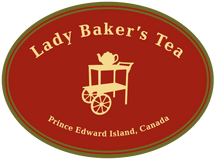What exactly is Orange Pekoe?
Without a doubt, the most popular question I get asked at the market booth is
"Do you have any plain old orange pekoe tea?"
For Maritimers, 'orange pekoe' is considered the traditional tea of choice!
I grew up on Red Rose Orange Pekoe tea never questioning what those two words, orange pekoe, meant? It's one of those accepted terms that we don't even notice! At the market I offer 'specialty' teas which are not available in the tea bag format. But I do have orange pekoe teas. So what is orange pekoe?
First of all orange pekoe is not an orange-flavoured tea nor in any way associated with the orange fruit!
Orange Pekoe is a classification of black tea based upon the origin of the leaf. To be classified as pekoe, the tea must be composed purely of the new flushes - a flush being the leaf bud plucked with two youngest leaves. (Any other leaves produce teas of lower quality.)
So...the orange pekoe term refers to a grade of black tea based on the size of leaf and its location on the tea plant.

Would you like that term 'orange pekoe' to make more sense?
Well, pekoe is actually pronounced 'pek-ho' and is derived from a word for a special kind of Chinese tea, meaning white downy hair referring to the down-like hairs on the tea leaves that are the youngest and smallest on the plant.
And the 'orange' part? It is most likely that the Dutch East India Company had something to do with this description. The Dutch royal family was of the House of Orange. In the 1600s the company brought teas to Europe and the best of the black teas was reserved for the royal family. When it was introduced to the public, it became known as the 'orange' pekoe, associating it with royalty!
Thus, a grading system with the term orange pekoe (OP) began.
But if only it were that simple!
We have FOP (flowery orange pekoe) - tea made from the end bud and first leaf of each shoot.
GFOP (Golden flowery orange pekoe) FOP with golden tips
TGFOP (Tippy golden flowery orange pekoe) FOP with a large proportion of golden tips.
Should I stop here? Can you guess what the grade is of FTGFOP? How about SFTGFOP?
I mentioned early in the blog that I carry orange pekoes. There are flavoured orange pekoes which I do have, but I was referring especially to the common traditional tea that people in the Maritimes tend to think of as 'just plain tea'. The two that fit this description are Ceylon (Sri Lanka) and Assam (India). They are TGFOPs! And both of these are from single organic estates, not blended with other leaves from estates in the area.
Most tea bags are made up of the fannings, the finest siftings of the processed OP teas. But that's another story!
I hope this has been helpful. Next time you drink your black tea, think about that beautiful downy leaf plucked by trained hands using the pads of the fingertips to give you that perfect cup you and I enjoy so much!

21 comments
I like this blog because it not only helps me understand teas, but it keeps mentioning the Maritimes, an intriging place compared to Auburn, Alabama, USA.
Pekoe is a term commonly used among tea growers and tea traders to describe young leaf shoots bearing white down (fine hair). It’s a system of grading tea.
The term Orange refers to the House of Orange-Nassau, the monarch family of the Netherlands. They imported tea and were pioneers in producing their own tea.
Pekoe doesn’t mean a specific kind of tea in Chinese. It just means tea made with new bud and no leaves. It is pale and hairy. It can be made into all 6 kinds of tea, but it is most often made into green, yellow and white tea because the shape can be preserved.
Normally, Chinese tea is made with “1 tip 2 leaves” meaning all 3 leaves are puked at once.
In the English tea system, the tip and 2nd leaf is Orange Pekoe, the 3rd and 4th are Souchong. Which is messed up. Souchong is a type of tea from Lapsang.
Anyway, a new type of tea called “Jin Jun Mei” (2005) is an upgrade of traditional “Lapsang Souchong”(black tea) made with just the “pekoe”.
Hi being a very loyal drinker of Darjeeling tea and having studied at North point, we had a very simple explanation. The acronym is reference to the cut and orange pekie is a full leaf. And in this day andagewith CTC ruling the tea drinking market, leaf is considered as a luxury
I buy tea from a specialty store, and, having tried teas from different countries, I can say, hands down, I prefer Ceylon orange pekoes. I recently bought some Assam tea, which is very nice, too…Tiripati, I think. I make yes every afternoon in autumn and winter…….it is a great blessing!